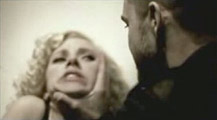 TWO FOR THE SEESAW (1962)
TWO FOR THE SEESAW (1962)*1/2 (out of four)
st. Robert Mitchum, Shirley MacLaine, Edmon Ryan, Elisabeth Fraser
sc. Isobel Lennart, based on the play by William Gibson
dir. Robert Wise
Less a movie than the connective tissue between Robert Wise's West Side Story and his The Haunting, Two for the Seesaw begins like the former, with baroque urban vistas that diminish the normally imposing Robert Mitchum against Manhattan skyscrapers and various Modern Art monstrosities. The city is curiously ghostly, almost post-apocalyptic, and from this we extrapolate the Mitchum character's lonesomeness--though maybe, just maybe, Wise has an ulterior motive for all that negative space, since the movie permanently headquarters itself inside suffocating tenement buildings thereafter. (It does grimly feel, in retrospect, like one last stroll around the courtyard before a stay in solitary.) Based on a William "Not the Guy Who Coined the Term Cyberspace" Gibson play that's allegedly a comedy, Two for the Seesaw eventually pairs off square Jerry (a self-consciously miscast Mitchum)--a lawyer, we come to learn, from Nebraska--with archetypal Greenwich Village pixie Gittel (Shirley MacLaine, who exacerbates comparisons to The Apartment, especially once Gittel falls ill). They bond over a tentative phone call Wise shoots in splitscreen by sandwiching the two sets together and dollying out--a visual that, however clever (it probably cinched veteran cinematographer Ted McCord's Academy Award nomination, as it really exploits 'scope's potential in a world increasingly inhospitable to roadshow spectaculars), unfortunately clamps the material to its stage roots, albeit while foreshadowing the parlour tricks of The Haunting.
Despite overtures, though, I don't think you can call the ensuing relationship a romantic one: for starters, Jerry and Gittel never, to my recollection, kiss; for another thing, Jerry is less a lover than an overprotective father, infantilizing Gittel so much that you half expect him to burp her. (According to MacLaine's autobiography, her dynamic with Mitchum was just the opposite offscreen.) The obvious age gap between the two actors doesn't help, nor does the natural polarity between bureaucrats and bohemians, nor does our newly-conditioned sensitivity to the stalkerish manner in which Jerry conducts himself (he makes a habit of spying on her and even backhands her when she attempts to stoke his jealousy), which retroactively transforms Two for the Seesaw from ersatz Billy Wilder into a primordial New York, New York. If anything definitively sinks the movie, however, it's the tediousness of Jerry and Gittel's club-footed pirouettes around their True Feelings, which seem disingenuous to begin with. Two for the Seesaw is, quite frankly, one for the cinematic dustbin.
Next time: The Private War of Major Benson


